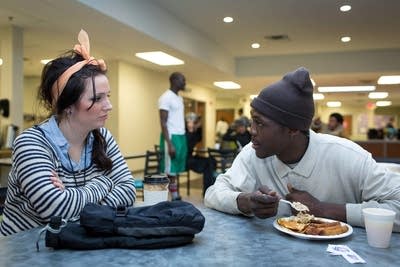In Hennepin Co., survey of homeless zeroes in on youth
Go Deeper.
Create an account or log in to save stories.
Like this?
Thanks for liking this story! We have added it to a list of your favorite stories.

All over Minnesota on Thursday, communities were counting the number of people who are homeless. The annual one-day "point-in-time" count is required by the federal government.
In Hennepin County, outreach workers were particularly focused on homeless people under age 25. Hennepin is one of nine sites, along with Boston and New York, piloting the in-depth survey.
A federal official was in town to learn from the county's experience as part of a stepped-up effort nationally to count and characterize homeless young people.
At the YouthLink drop-in center in Minneapolis on Thursday morning, young people sat in corners, answering workers' questions about their lives. Some interviews took place in private rooms, because the questions can get personal.
Turn Up Your Support
MPR News helps you turn down the noise and build shared understanding. Turn up your support for this public resource and keep trusted journalism accessible to all.
Tiffany DeMars, 21, answered the survey and, afterward, talked about how she became homeless.
"My mom started using crack cocaine. Things became very depressing in my house," she said. "We never had any food. I had a younger sibling, he was 4. There were days he wouldn't even eat all day. He'd go home to his dad crying, like -- 'I'm hungry.'"
Two months before her 15th birthday, she struck out on her own.
"I told my mom, 'I'm leaving, I'm gone. I'm not going to watch you kill yourself. That's not something a teenager should have to do.'"
That very first night, in downtown Minneapolis, she traded sex for a place to stay.
These days DeMars sleeps at a Salvation Army adult shelter. Over the years, she has stayed at all sorts of places.
"There's been points I stayed up all night, walking around downtown. I've slept in parks, abandoned buildings. All of that. Everything, really, that you can think of as to where I've been, I've been there."
DeMars earned her GED, and this fall, she plans to go to community college.
Heather Huseby, the executive director of YouthLink, which serves homeless youth, said: "These are youth at a crossroads. They are either going to make it now, or they're going to be incarcerated, or they're going to be long-term homeless, or they're going to be dead."
She continued: "We believe that these are the youth -- this is a population that still has the light. Unfortunately, it's been a group that's often not paid attention to, and forgotten.
Cathy ten Broeke, the state director to Prevent and End Homelessness, said the state needed better data on homeless youth.
"In order for us to actually do a good job and see if we can make significant progress on homeless youth, like we have with homeless veterans and chronic homelessness, we need to understand who these homeless youth are in a much more significant way," she said.
Young people are especially vulnerable, ten Broeke said.
"When a homeless youth enters homelessness and they land on the street, we know that it's something like within the first 48 hours, they are approached by a pimp [or] they are asked to do something illegal," she said. "I mean, they are so vulnerable. And they're 17 or 18 years old."
But the survey was a challenge -- because homeless youth can be hard to find. They're often couch-hopping.
"Youth, I think, are very good at hiding the fact that they are homeless," said Lisa Thornquist, who leads the Office to End Homelessness for Minneapolis and Hennepin County. "I know many youth who are homeless who would never consider themselves homeless, who would never think about that label, and yet they have no place to live."
Outreach workers were determined to find them on Thursday, at schools, libraries, bus stops and elsewhere. Ten Broeke said it's important effort.
"If we can intervene early enough so that the trauma of homelessness doesn't overtake them, they're pretty amazing and pretty resilient," she said. "So we want to get to these young adults now, and early, and make sure that they don't become our homeless older adults."
Results from the survey will be available in a few weeks. Meanwhile, groups that work with homeless youth plan to ask the Legislature for $8 million this session.
• Follow Julie Siple on Twitter: http://www.twitter.com/juliesiple_mpr







